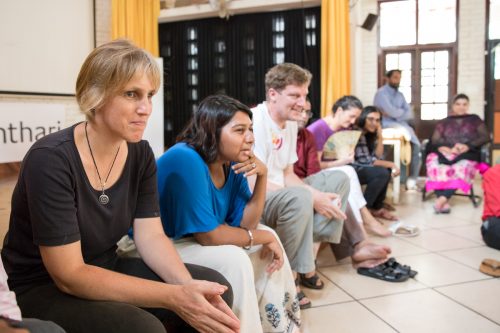

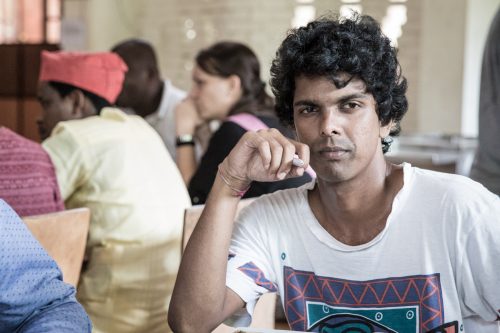
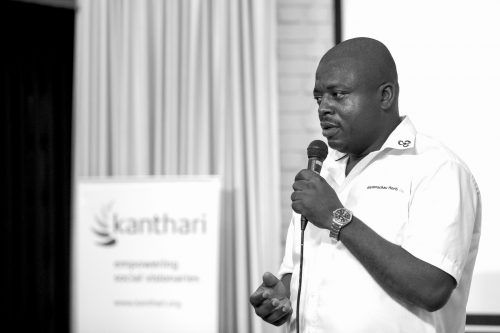
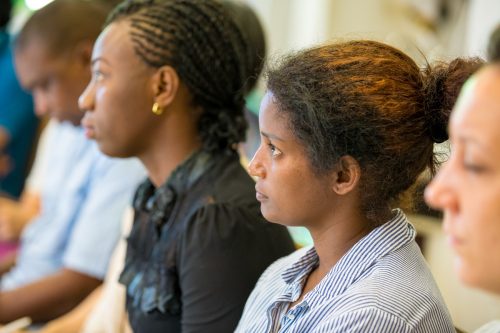
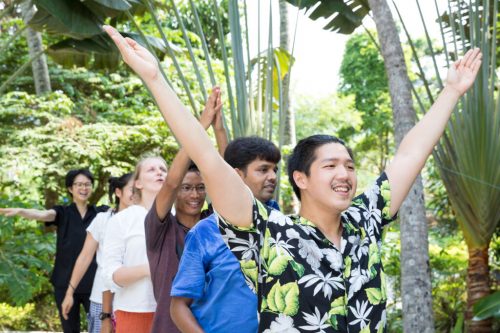
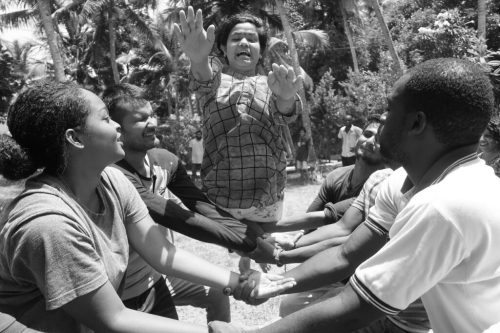
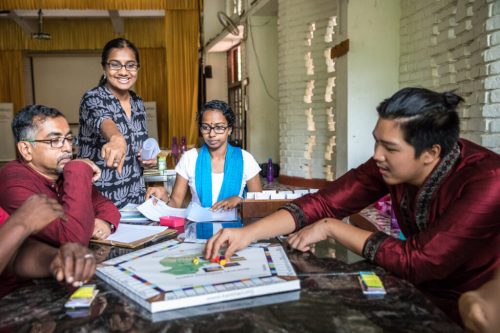
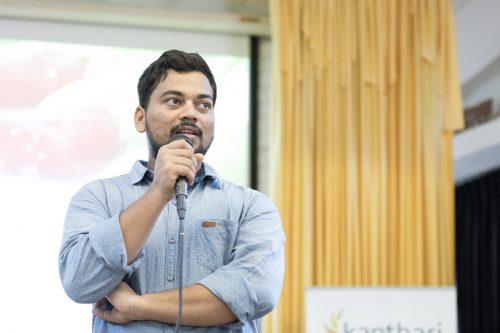
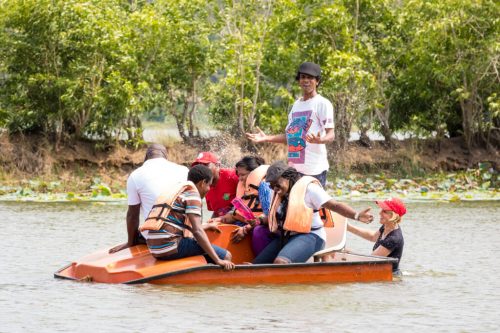
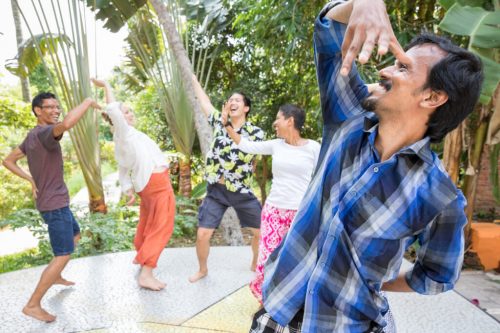
PROLOGUE
Our participants are selected because they come with creative and often unique ideas to create a significant change in their community, a change that might have a role model effect on other regions, societies and countries as a whole.At kanthari our focus is not on scale but on quality, not on 1000 conventional social project ideas, but on the few that create relevant mindset changes. Changing people’s mindsets needs fire, spice, and the guts to challenge the status quo. But this requires divergent, creative, out-of-the-box-thinking.
The fact that the participants are ready to come to Kerala and join a very unconventional, hands-on, creativity driven program which is more a springboard rather than a training course, shows that they are open to new approaches. However, most come from regular schools, colleges and universities and are used to thinking in templates, obvious structures, methods, terms, log frames and boxes.
To empower them to make their dream even more creative, interesting and therefore more significant, we want to guide them through a journey which will provoke their habits, thoughts and actions. By providing a new, unconventional learning environment, catalysts lead the participants to new ways of solving problems.
A Journey in five acts
The kanthari curriculum, a journey in five acts, will take the participants through a series of activities that lead them to being able to start their own social ventures/initiatives. In this way the course can be seen as a vocational training. During the program, kanthari offers a six-month Diploma course in Entrepreneurship skills development which is affiliated to Bharath Sewak Samaj, National development agency, promoted by the Government of India.
The first four acts provide many opportunities to experience theoretically and practically what it means to set up, run and/or advise an already existing social initiative. After the fourth act the participants won’t be beginners anymore and they will be ready to jump into the fifth act in order to start or continue their personal projects/initiatives in the region of their choice.
The major difference between the kanthari program and other leadership courses is the following:
- Instead of theoretical lectures, we focus on learning by experience.
- We don’t have teachers, instead we have catalysts.
- We don’t believe in comparing or competition. Therefore, we won’t measure one’s progress with grades but with “SHUs”.
What is a catalyst?
Catalysts are not teachers in a conventional way. They are experienced starting initiatives, overcoming crisis situations and solving problems and thus can be seen as experts in one or the other field, willing to exchange knowledge with the participants, who are in one or the other way experts themselves.
The difference between a catalyst and a participant is only marginal. While the participants are taking part in the kanthari program to be prepared to create ethical social change, a catalyst gives the necessary energy and substance to go forward. Thus, the catalyst can also be seen as a tour guide through the kanthari curriculum, which is named “a journey in five acts”.
All about Shu’s
kanthari does not measure progress through grades because we believe that a comparason among participants of different backgrounds and their very different projects can not be justified.
Therefore we developed our own measurement of progress, the SHU system”.
“SHU” stands for Scoville Heat Unit, a unit that measures spice. But at kanthari the SHU is used to evaluate participants’ ability to:
– work according to deadlines
– deliver high quality written and verbal assignments,
– starting projects proactively
Assignments only include those documents, media elements or performances that can be used for promoting and running their organisations at a later stage.
For each satisfactory assignment, participants earn a SHU with a fixed SHU-value from one to five (SHU Value Point: SVP).
At the end of each act, the participant needs at least 85% of all SHU-Value-Points in order to pass to the next act.
Preparation: The Green Room
Since 2021, due to Covid restrictions, the catalyst team has developed an online program that prepares all selected participants in weekly sessions and through the help of individual mentors for a smooth transition to the actual residential seven months program.
In participatory workshops the curriculum and all learning methodologies are introduced.
After this preparatory act participants have a basic understanding about technical requirements such as
• Budgeting and bookkeeping,
• Creating one’s own website,
• Making meaningful photos,
• Interviewing future beneficiaries and telling their stories,
• Creating a functional database,
And much more.
Act One: Setting the Stage
After a 2 week break in which participants have time to travel, the residential program starts with the first act which is all about methodologies and techniques that are required to start a social or environmental initiative. Through practical activities and while starting their projects first in a virtual world, participants are guided through the following focus points:
• Intercultural dialogue and conflict / crisis management,
• Pitches, Speeches and presentations,
• Problem definition and stakeholder mapping,
• Problem solving and concept transformation
• Vision / mission and finding one’s blue ocean,
• Team building,
• Questioning their own venture ideas, taking them apart, trying to improve them and coming out with the most unique version possible,
• Working with media and experiencing the ups and downs of publicity,
• Practicing financial planning, bookkeeping, and reporting,
• Raising funds through grant proposals, advertisements and events.
Additionally, we offer an opportunity to develop products in the areas of healthy food, waste to value, environmental friendly habitat and natural body care. See more about “inani” here (page 3)
All these topics will be explored further in the coming acts.
The first act ends with a thorough feedback week regarding the self development, the team work during the act and the status of the social venture idea.
Act Two: The Wild World
During the first three weeks of Act 2, participants will focus on creating a written venture profile which consists of
• a solid problem definition with an analysis of their future target group,
• a description of their solution including objectives and strategies, budgets and action plans as well as,
• a personal profile that explains the personal motivation the life story with pinching point and the dream that will be realized.
During the second part of Act 2, catalystts and participants will together go on an exposure tour to grass root level initiatives within the south of India. Several of these organisations are run by kanthari graduates.
The main emphasis is on
• reality check,
• exposure, peer learning,
• grass root level research and
• consolidating the findings and laying a solid foundation for their social ventures to be launched in the future.
Act Three: Overcoming Barriers to Change
kanthari also offers a Diploma course in Entrepreneurship skills development which is affiliated to Bharath Sewak Samaj, National development agency, promoted by the Government of India.
Prepared by Act 1 and Act 2, participants will now be ready to undergo an intensive business training to be able to start a social entrepreneurship which can contribute to social change and can be used as a source of additional income generation.
This act is based on previous training in:
• Concept transformation (act 1),
• Finances (act 0 & act 1),
• Product development (Act 1), and
• Proto typing and testing (act 1 and act 2)
Act three offers a creative, hands on approach to social entrepreneurship which results in a practical and theoretical examination.
We call the BSS certified diploma-program BASCH (Business And Social CHange).
BASCH introduces all aspects of starting and running a social enterprise.
• Project planning and management,
• Branding & marketing,
• Strategies of overcoming barriers to change, and
• Finances and investment.
In the end of act three, each participant will have:
1. A realistic business plan for a social enterprise
2. An attractive logo, a name, and a brand for all senses,
3. A look and feel document as the basis for branding
4. A model for a sales store
5. (if you have passed the exam) a certificate for entrepreneurship by the government of India.
Additionally, you gained a lot of experiences on how to plan, finance and manage a public event.
Act Four: Run, Jump and Swim
The social venture had time to mature during Act 1, Act 2, and Act 3 and is now ready to be finalized for the start.
Act 4 is the last act in campus. It is divided into 3 parts:
Part 1: Starting one’s organisation,
Part 2: Developing appropriate communication,
Part 3: Going public.
The highlight of act four are the kanthari talks in which participants present their story and ideas to a global audience.
Throughout Act 4 we focus on:
• Fundraising through sending out first proposals,
• Planning of the first actions to execute during the start-up phase,
• Getting knowledge about buying land and constructing buildings in an ecological sustainable way
• Creating high quality media content for websites and social media platforms
• Becoming professional public speakers
• Gaining confidence in critical Q&As, media interviews and on hot seats,
Before starting with Act 5 and their organisation back home, participants have filled a virtual backpack with the following items:
• A compelling name for the social/environmental venture
• An adequate and attractive brand with name cards, cover-page, letterhead, look and feel document, with a jingle and a specific snack or drink,
• A user-friendly and informative website with a payment gateway for donations
• Personalized templates for cashbook, budgets, and agreements,
• An organisational policy
• An individualized question bank with most frequently asked questions and well thought out answers
• Media elements such as a 30-second video pitch, a 10-minute professional video of the kanthari talks stage performance, and relevant photographs
• Free and formal model proposals for the start of their initiative,
• A six-months budget and a concrete action plan for the start-up phase
• A donor database with high potential foundations to approach
• A set of relevant and well written documents about one’s venture that can be used as building blocks for web-content, fliers, brochures and proposals,
• A ready-to-go business plan with product and/or service specifications for a social enterprise that can be an additional source of income.
• A kanthari certificate which serves as a license for positive change and a diploma for entrepreneurship by the government of India (if they have passed the exam).
Participants are also guided and encouraged to use their journey with the kanthari talks in the end as a crowd funding opportunity to raise substantial means for starting their projects in Act 5.
Act Five: Change from Within
With the beginning of Act 5, the program has finished but the journey of the social venture starts. Each certified kanthari participant now carries a virtual backpack which contains most of the items someone needs to have when starting and running a social venture. Yet, the road in the starting phase will be bumpy.
They return to their home countries, well prepared and motivated to overcome the main challenges, ready to commence their social ventures. Now they have the confidence to turn their dream into reality.
kanthari offers mentorship support for those who start the social or environmental ventures right away:
All have access to a kanthari mentor who provides at least one hour a week to help through giving advice or reviewing prepared written documents. These mentors are kanthari alumni who have gone through the difficult starting phase themselves.
Once the start-up phase has been accomplished, the participant will graduate with the following benefits:
• Becoming part of the international alumni network (knock: kanthari network of change and knowledge)
• Receiving full access to the kanthari owned online encyclopaedia, called “spice box” which contains all learned kanthari tools, but additionally provides many real life examples and detailed explanations.
• Being called a kanthari which for many supporters is an indicator of quality, dedication, motivation and accountability.
